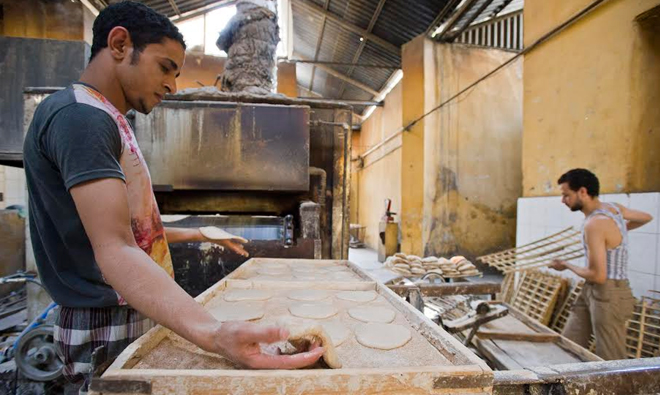Egypt has rolled out a series of reforms to its decades-old bread subsidy system in the hopes that it will reduce the nation's bread consumption and minimise corruption.
The new smart-card system, which entitles card owners to a fixed ration of five loaves of bread per day, was first introduced in the spring in cities in the Suez Canal and Alexandria and arrived this month in several Cairo districts.
The reforms aim to alleviate the burden of subsidy spending on the state budget.
Subsidised bread is sold at the unchanged subsidised price of LE0.05 per loaf – far lower than the LE0.35 price on the free market, with a maximum of five loafs of bread per day for each individual.
But in an effort to crack down on smuggling and waste, the government has decreed that bakers will no longer buy flour at the subsidised price. Instead, they will be reimbursed by the state based on sales data gathered from the smart cards, available to 18 million families and from which 69 million citizens benefit, according to Supplies Minister Khaled Hanafy.
"No baker will now be able to profit from selling subsidised wheat for private gains," Ahmed Kamal, a baker selling subsidised bread in the lower-middle-class district of Sayeda Zeinab, told Ahram Online.
Some low-income Egyptians welcome the novelty of no longer having to queue for their daily share of bread in front of bakeries, as first-comers might hog the cheap bread.
"We find the rations more convenient because we no longer have to stand in long lines or worry about not finding bread," mother of two Dawlat told Ahram Online after easily buying her family's ration.
However, others complain of the small ration, saying that it is not enough for three meals a day.
"Workers who burn a lot of energy and live on pasta and fava beans sandwiches cannot live on five small loaves per day," Oum Hamada told Ahram Online while buying her bread.

(Photo: Bassam Al-Zoghby)
The government is trying to create incentives for people to consume less than their ration of bread to reduce spending on wheat.
Having been heavily subsidised for decades, bread is a main staple of the Egyptian diet, forcing the government to import increasing amounts of wheat to meet local demands, with local production never providing half of what is required to sustain the nationwide bread subsidy programme.
Egypt, the world’s biggest importer of wheat, purchased 3.7 million tonnes of local wheat and also bought 5.46 million tonnes of wheat from abroad during the 2013-2014 fiscal year which ended June 30.
In the new 2014-2015 fiscal year, the main state grain buyer, the General Authority for Supply Commodities, has so far held two tenders and bought 480,000 tonnes of Romanian and Russian wheat.
To encourage a more diversified diet, the government plans to offer smart-card holders a wider range of subsidised commodities (starting with 20, to be raised to 100 next month), including red meat and poultry, which can be purchased with points saved by consuming less than their due ration of bread loaves.
Ration card holders will also be entitled to LE15 a month for each individual instead of a traditional fixed ration of subsidised rice, sugar and cooking oil, the only subsidised goods previously available to consumers.
Under the old system, families with four members were entitled a maximum of 8 kg of rice, 8 kg of sugar and 6 litres of cooking oil at subsidised prices. The cost of 1 kg of subsidised rice was LE1; cooking oil was LE3 per litre and sugar LE1.25 per kg.
The new system offers cardholders these products at higher prices, where 1 kg of rice now costs LE4, 1 kg of sugar now costs LE4.5 and each litre of cooking oil ranges from LE8 to LE10.
"New prices are almost like the free market," said the owner of a grocery store selling state-subsidised goods in the low-income neighbourhood of Al-Zawya Al-Hamra.
The average Egyptian household spends 46 percent of its income on food, less than 2 percent on energy and some 0.06 percent on electricity, Social Solidarity Minister Ghada Waly said in a televised interview last week.
The new food subsidy system and discounts at state grocery stores are meant to counter possible price hikes on the back of cutting fuel subsidies, said Hanafy in the same interview.
Earlier this month, the government of Egypt raised the prices of three widely used state-subsidised fuels – 80 octane gasoline, 92 octane, and diesel fuel – by up to 78 percent.
The move is part of a larger effort to rein in Egypt’s budget deficit to 10 percent of GDP in the 2014/2015 fiscal year by cutting LE44 billion in spending on energy subsidies, among other measures.
Egypt's three state-owned grocery chains generated profits in June for the first time since their establishment in 1968, reported Al-Ahram's Arabic news website on Friday.
Al-Ahram, Nile and Alexandria consumer complexes witnessed net profits worth LE1.8 million in June after a whopping increase in sales. The three chains generated LE131.2 million in sales in June compared to LE80.7 million in the same month of last year.
Though food subsidies increased to LE31.6 billion in the 2014/2015 budget compared to LE30.8 in the 2013/2014 budget, they represent 4 percent of total expenditure in 2014/2015 budget compared to 4.2 percent in 2013/2014.
The country's poverty rate has increased, reaching 26.3 percent for the year 2012/13 compared with 25.2 percent in 2010/11, according to the latest reports from state-run statistics agency CAPMAS.
The domestic poverty line stands at an annual income of LE3,920 ($569) per person, while those earning below LE3,570 ($518) per person are considered to be living in "extreme poverty," according to CAPMAS.

(Photo: Bassam Al-Zoghby)
Short link: